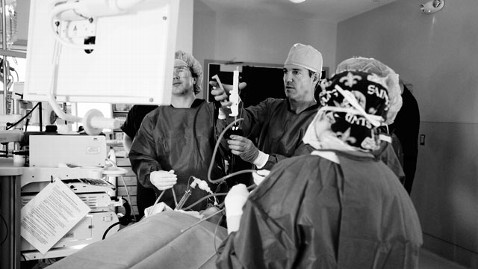New Weight Loss Surgery: POSE Performed Through the Mouth

Dr. Tom Lavin performs POSE surgery. (Shana Druckerman/ABC News)
Would you have surgery to lose 30 pounds? A controversial new procedure in weight loss has patients pleased but critics concerned.
In a quaint suburb of New Orleans, women are lining up for a new weight loss surgery called the POSE procedure. Short for Primary Obesity Surgery Endoluminol, the surgery is done outpatient and is incision-less. Dr. Tom Lavin, of Surgical Specialists, is one of only a few surgeons in the United States who is offering the procedure. He invited us down to see a surgery on one of his patients.
There's a big difference between this new option and other, more common forms of bariatric surgery like gastric bypass, lap band, or sleeve gastrectomy. POSE is being marketed to women who want to lose 20 to 50 pounds as opposed to a typical weight loss surgery patient who drops 100 to 150 pounds. With the POSE procedure, everything is done through the mouth. An endoscope and surgical tools are used to pinch sections of the stomach, primarily the fundus area, and then sutured to make the stomach smaller. The size of cavity, according to Lavin, is typically reduced about 20 percent. His patients are reporting not only weight loss, but also fewer cravings.
Dr. Lavin wanted to make it clear that POSE has not worked for all of his patients. He conceded that 15 to 20 percent are not affected by the procedure. And weight re-gain, just like with any other bariatric procedure, he says, is also a possibility.
When my producer and I raised this story in a staff meeting, several female colleagues were ready to sign up. POSE is promising news to a population of women (and men) who would normally never be considered for other bariatric procedures, but who still battle, through diet and exercise, to lose weight and keep it off.
But before you book your ticket to the bayou state you should know this: No long-term studies have been done in the U.S. to test the safety and effectiveness of the procedure. The device that is used for the surgery has been approved for other uses by the FDA, but does not yet have the sign off for weight loss surgery.
Other members of the bariatric community won't touch it without further study. Dr. Shawn Garber of New York Bariatric Group warned, "You are putting needles through the patient's stomach, you are putting a device down through the esophagus, there are risks. And to put someone through the risk of those things without any proven benefit is definitely controversial."
In answer to colleagues, Lavin has this to say, "When I came into surgery in the early '90s, everything was done open. Then people started doing things laparoscopically and it was a little questionable at first and they didn't know how is this going to go, and of course it changed everything."
"These patients have struggled their whole lives," he said. "I'm offering them something that is effective and safe in my hands."
Watch the full story on the "Losing It: The Big Fat Trap" on "20/20? online.